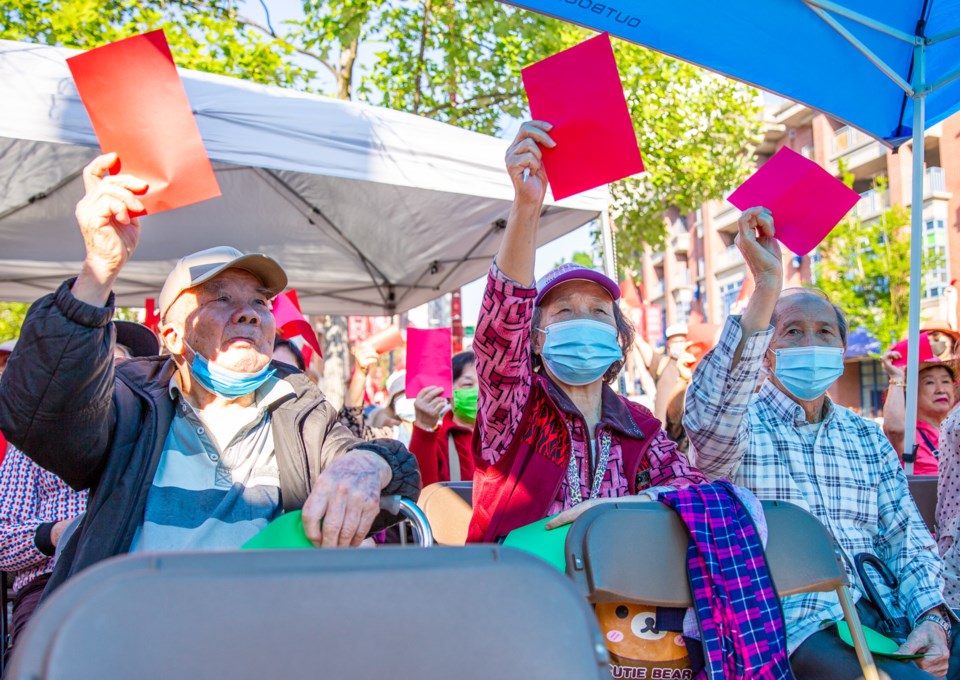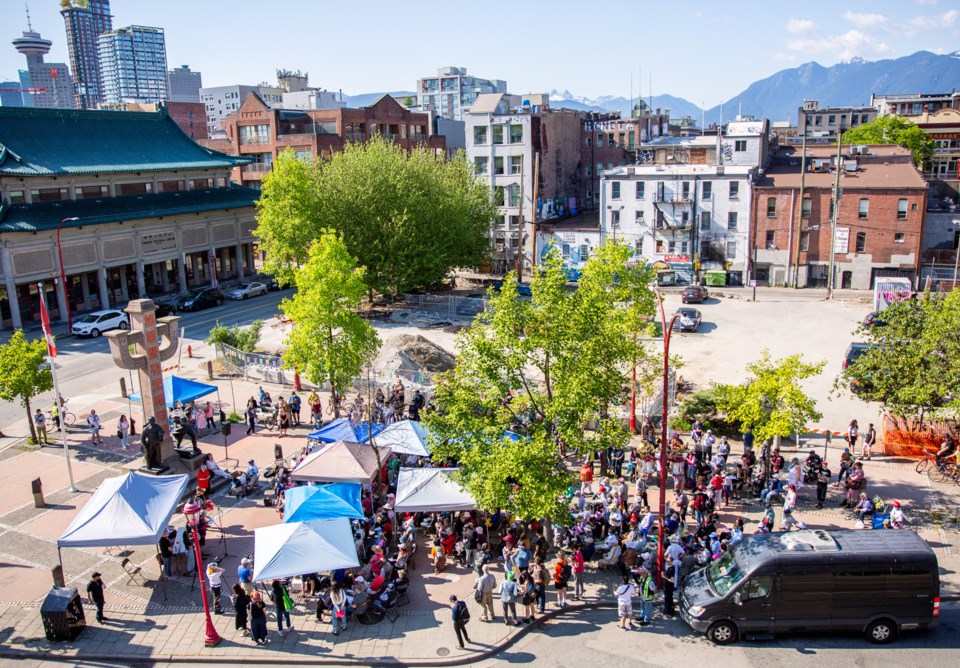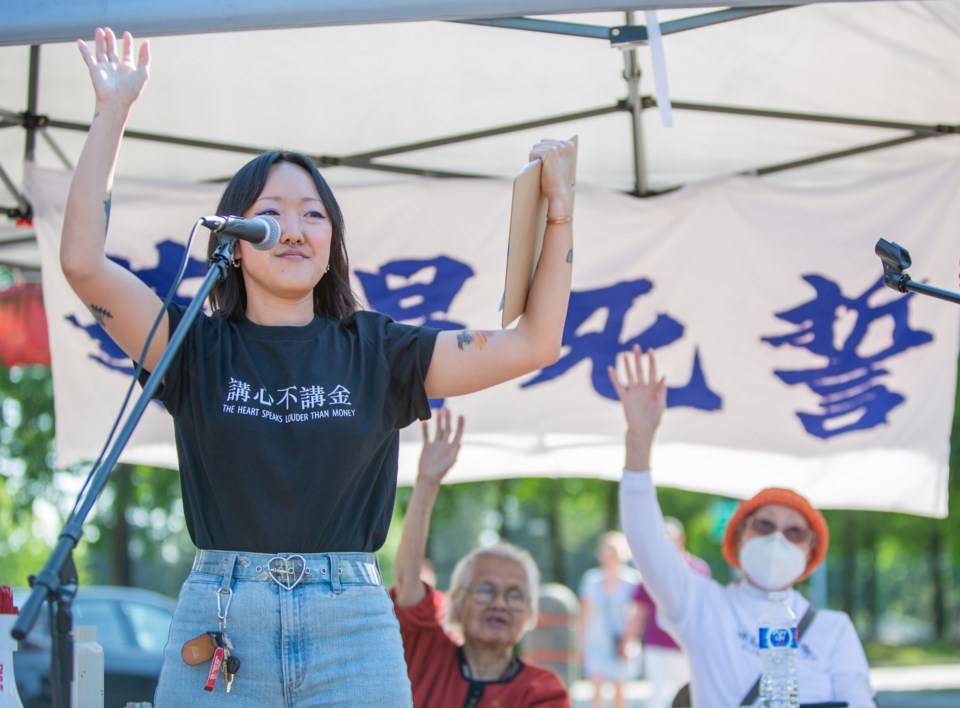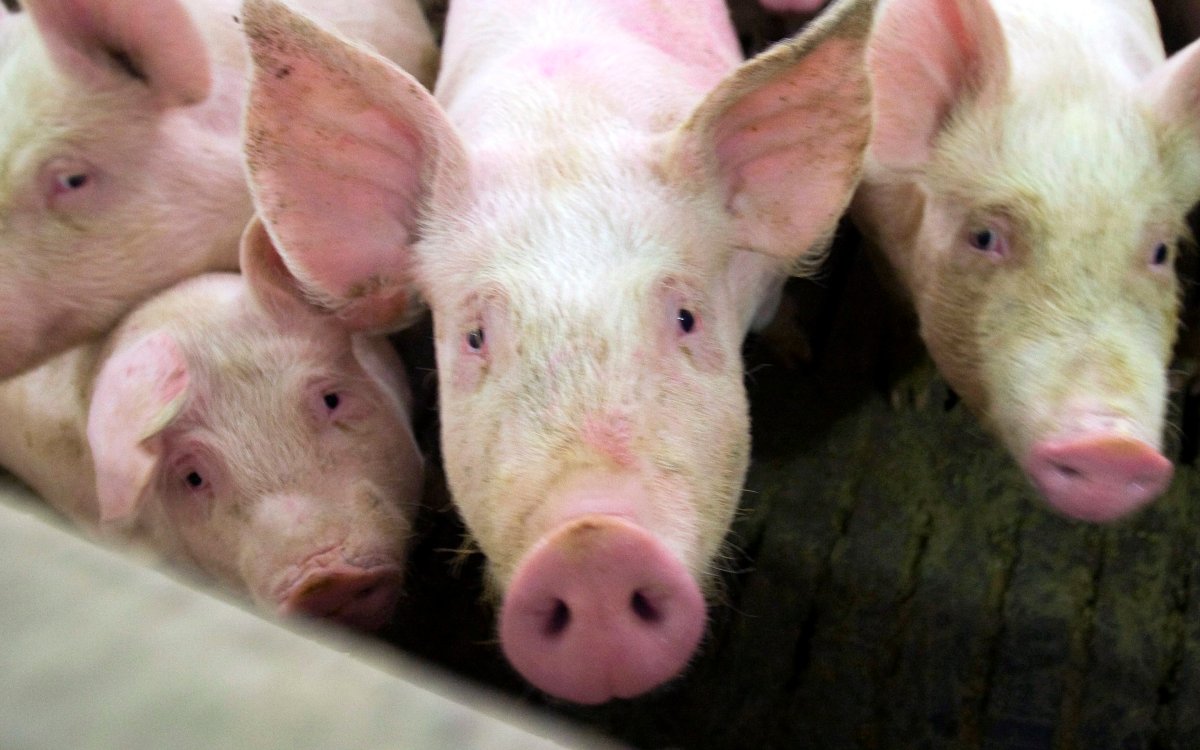Why — after a decade — the controversial tower proposed for 105 Keefer in Vancouver seems likely to move forward

It has been 2,028 days since the Vancouver Development Permit Board ruled against approving a tower at 105 Keefer Street.
And in 2 more days, they’ll have the debate all over again.
“Beedie Beedie, you can't hide. We can see your greedy eyes,” sang protesters at a rally of around 300 people on Thursday evening against the resubmitted proposal by the Beedie Group for the nine-storey tower, which the permit board will consider on Monday.Chinatown condo project is back on the table and dividing the neighbourhoodIn the decade since the proposal was first brought forward, dozens and dozens of news stories — and even a thesis or two — have been shared about 105 Keefer.
Admittedly, when you consider how many redevelopments happen across the province every month, those outside Vancouver could consider it overkill.
But it’s been a powerful debate because of the confluence of issues the parking lot represents: across the street from the Chinese Cultural Centre, two blocks from the Downtown Eastside, owned by one the city’s most prominent developers.
However, there are strong reasons to believe that this vote, unlike those in the past, will move the project forward.
First, all the people involved in rejecting the original tower — first at the council table, then at the permit board — are no longer with the city. The only person on the permit board who voted against killing the project in 2017 is now Vancouver’s city manager, Paul Mochrie. The city has already lost one lawsuit on the issue and has been ordered by a judge to give better reasons should it reject the project again.
Next, Vancouver’s election brought a new ruling party in ABC Vancouver that has talked consistently about building more housing and has explicitly talked about a change in focus for Chinatown, with one councillor alleging “misinformation” and “misleading renderings” by opponents of the proposal.
Third, while in 2017, there were very few Chinatown groups explicitly supporting the proposal, this time around, seven of them have jointly lobbied for its approval.
Beedie also commissioned polling on the proposal, and in a sample size of 330 Vancouver residents contacted my phone, 43 per cent said they supported the project, vs. 22 per cent who said they had mixed feelings, 17 per cent who opposed it, and 18 per cent who said they didn't know.
(The poll was done by Fairview Strategy and has a margin of error of 5.4 per cent 19 times out of 20)
And so the odds seem in favour of the tower being approved. But whatever way the vote goes, the fault lines will remain.
After all, next door to 105 Keefer, there’s a nine–metre-long neon sign saying “Let’s Heal the Divide.”
It was created by Toni Latour, who, on her website for the piece of art, says Chinatown is “a neighbourhood confronted with gentrification, class inversion, and the threat of cultural displacement from urban developers and city rezoning.”
If the tower is approved, the sign will be blocked out.
Crowd of 300 gathers to oppose contentious Vancouver Chinatown condo proposal

Beedie (Keefer Street) Holdings Ltd. will go before the city’s development permit board May 29 to make another attempt to get its 111-unit condo development approved at 105 Keefer St., which currently serves as a parking lot and construction material storage area.
The message from speakers Thursday at the Chinatown Memorial Plaza and those interviewed during the rally was clear: they don’t want luxury condos, and the site should be 100 per cent social housing.
“We hope that the government will work with the developer to build luxury condos for low-income tenants,” Zhi Ping Zhang, 70, told the crowd in Cantonese to applause. “Even though we are low-income residents, we are the majority and we need to be united to fight for our rights.”
Zhang, who recently moved out of a single-room-occupancy hotel into social housing in Chinatown, was among a large group of seniors who attended the rally, with some arriving on a bus from a nearby seniors’ home.

Housing that seniors can afford
Members of the Indigenous community and the Vancouver Area Network of Drug Users also spoke to the crowd, and emphasized the need for more low-income housing in a city where homelessness and poverty persists, particularly in the Downtown Eastside.
Former city councillor Jean Swanson said the Beedie proposal is opposite of what is needed in Chinatown, which has seen an increase in pricey restaurants and cafes near some of the newer condos built on Main Street.
“What we need is housing that lower-income folks and Chinese seniors can afford,” said Swanson, standing at a microphone in front of a monument in the plaza that honours Chinese-Canadian veterans and railway workers.
“What we get with this project is probably million-dollar condos with residents who can afford Virtuous Pie, but aren’t likely to be customers for Kent’s Kitchen or Gain Wah [on Keefer Street].”

Higher building rejected in 2017
The fight to stop Beedie’s proposal has been a protracted one, with the city at one time discussing a land swap or purchase of the property for $22 million. In 2017, the council of the day opposed the developer’s original 12-storey, 118-foot project.
Reasons given by the Vision Vancouver-dominated council included the building’s design being too bulky and that it would block views and cast shadows on the neighbouring Dr. Sun Yat-Sen Classical Chinese Garden.
They also said the building wouldn’t preserve the heritage and cultural character of Chinatown, and that there wasn’t enough social housing in the plan, although 25 units were included in the project.
Beedie revised its application and reduced the project to nine storeys and 90 feet tall, erasing the need for a rezoning or public hearing. The social housing component was also wiped from the new proposal.
That was the version rejected by the development permit board in a 2-1 vote in 2017.
Beedie refused to accept the decision and took legal action, which led to a B.C. Supreme Court ruling in December 2022 that has allowed the developer to make another pitch Monday to the development permit board.
That pitch will be for the identical proposal rejected in 2017.

'We've got to try again'
Jade Ho, one of the organizers of the rally and a member of the Vancouver Tenants’ Union, acknowledged the difficult task to convince three members of the development permit board to reject Beedie’s proposal for a second time.
“We have to try, right, because this is really important to the community,” Ho told Glacier Media. “And what we experienced in 2017 [with the development permit board’s rejection of the proposal] tells us that, yes, we can do it. So we’ve got to try again.”
Ho said the rally was organized to give people who wouldn’t otherwise go to city hall a venue to express their views, whether that be in English, Mandarin or Cantonese, which were all spoken and translated during the event.
“The processes of the city have been really inaccessible to the low-income residents in Chinatown and in the Downtown Eastside,” she said. “A decision that will make a such a big impact in the community should really be made by the residents here, by the people here.”
None of the development permit board members who voted in the 2017 decision will vote Monday, with Gil Kelley and Jerry Dobrovolny both having left their posts at city hall; city manager Paul Mochrie remains, but he will not cast a vote.
The voting members are expected to be the city’s director of planning, Theresa O’Donnell, head engineer Lon LaClaire and Andrea Law, general manager of development, buildings and licensing.
'Unprecedented, collective display of support'
The day before the rally, Chinatown Business Improvement Association Society president Jordan Eng circulated a news release saying the organization along with six others, including cultural associations, support Beedie’s proposal.
The others are the Chinese Benevolent Association of Vancouver, Chinese Freemasons of Vancouver, Dr. Sun Yat-Sen Classical Chinese Garden Society, Chinese Cultural Center of Greater Vancouver, Vancouver Chinatown Merchants’ Association and Vancouver Chinatown Foundation
“This is an unprecedented, collective display of support for our community, when it comes to development,” Eng said.
“While our community was divided over this issue [with Beedie's original 12-storey proposal], much has changed since then and today. We stand united in support for this project, and for the continued renewal of Chinatown; this important, historic and cultural jewel in our city.”
In an accompanying letter to the development permit board, the seven organizations outlined reasons to support the project, saying that with the exception of a long-ago closed gas station, the site has been a vacant parking lot for more than 50 years “and exists as an eyesore in the heart of Chinatown.”
“The proposal will add 111 units of housing without displacing existing residents and businesses,” they said in their letter. “More feet on the street will help reverse the descent of the district into further street disorder.”
Eng has said previously that more affordable housing is needed in Chinatown for seniors, and that he and other leaders in the community are working with the city to ensure more gets built as part of the Northeast False Creek Plan, which requires the Dunsmuir and Georgia viaducts to first be demolished.
Glacier Media contacted Beedie this week for comment on the protest and the support of the Chinatown organizations, but had not received a response by the time this story was posted.
In a previous statement, Rob Fiorvento, managing partner at Beedie, said “we continue to believe the 105 Keefer project will provide many benefits for Vancouver’s Chinatown, especially given the focus on revitalizing the neighbourhood since the development permit board‘s decision in 2017.”
The development permit board hearing begins at 3 p.m. Monday.







:format(webp)/cdn.vox-cdn.com/uploads/chorus_asset/file/24390406/STK149_AI_03.jpg)
:format(webp)/cdn.vox-cdn.com/uploads/chorus_asset/file/24687168/is_varghese_a_real_case.png)






